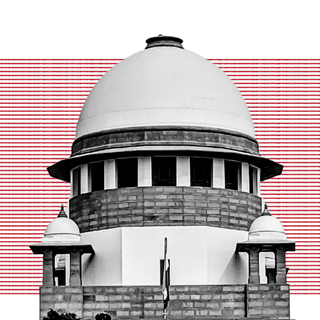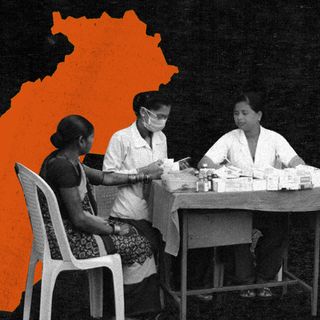
IIT Madras Faculty Resigns Citing Casteism, Serving as Another Reminder To Hold ‘Premier Institutes’ Accountable
Prestigious institutions such as the IITs are in dire need of an internal assessment of systemic issues, Veetil noted.

An assistant professor at the Indian Institute of Technology, Madras, resigned from his post alleging caste discrimination from people in “positions of power.” Vipin P. Veetil, Ph.D., was an economics faculty in the Department of Humanities and Social Sciences.
In a letter addressed to the faculty members that was shared on social media by an IIT Madras student body, Veetil stated that his resignation was triggered by exclusionary practices and that he would be pursuing action for specific instances of caste discrimination against him.
The IIT Madras administration has neither confirmed nor denied the claims. “Any complaint received by the institute from employees and students is attended to promptly through the established process of redressing grievances,” the Institute told Times Now. Currently, however, IIT Madras does not have a grievance redressal cell for SC/ST/OBC communities.
Allegations of caste discrimination in IIT Madras, or other engineering or similar “premier institutes,” are not new. In 2019, a member of the National Commission of Scheduled Castes (NCSC) said that employees and students from the SC and ST communities in IITM faced harassment and discrimination; IIT Madras had also failed to follow reservation norms in Ph.D. admissions and faculty recruitments.
In his letter, Veetil spoke of the need for a grievance committee in the institute to address the challenges faced by marginalized-caste communities. He emphasized that these committees should comprise members and psychologists from marginalized communities.
Related on The Swaddle:
IIT Kharagpur Professor Filmed Using Casteist Slurs Once Published a Study on Social Inclusion
One unnamed faculty member told The New Indian Express that the Institute hardly functioned during the time the professor joined as a faculty member, and that there was not much interaction among professors during this time. “He should share what kind of discrimination he faced. Reputation of IIT Madras, one of India’s premier institutes, can not be tarnished unfairly,” the faculty member added.
The fact that the IITs are “premier institutes” foreclose any debate about systemic inequalities or problems within the universities. Even before conducting an internal probe to look into allegations being made against the Institute, “reputation” is often the official line taken by the administration.
But this emphasis on the prestige of the institutes doesn’t just come from within. Last year, a union government panel consisting of faculty members from various IITs recommended that faculty appointments be exempt from reservation policies because they are “institutes of national importance,” citing the Central Educational Institutions Act of 2019 that exempts institutes of excellence from implementing caste-based reservations. This is “in order to compete with other top institutions in the world in terms of excellence,” the panel said.
Arguably, such policies have casteist undertones — implying that faculty members from the SC, ST, or OBC communities cannot contribute in a manner that would bolster the international reputation of the IITs.
It is worth noting, however, that Veetil is a well-credentialed professor who has taught and studied at international institutions before joining IIT Madras as an assistant professor. Despite this, allegations of caste discrimination suggest that the problem runs much deeper than notions of “merit” and that prestigious institutions such as the IITs are in dire need of an internal assessment of systemic issues.
Other issues for which the IITs have evaded responsibility and cited their reputation in the past are mental health crises and sexual harassment on campuses. In the aftermath of a first-year student — Fathima Latheef’s — death by suicide in 2019, the Institute responded with the following statement: “The social media trolling of the institute… is tarnishing the reputation of one of the finest institutes in the country.”
The present case highlights the need for IITs to change their response to mounting allegations of structural issues and set up internal mechanisms to address the same. Students have long alleged a lack of proactive measures by the administration to redress mental health issues and have called for information on the caste and religious backgrounds of students who have previously died by suicide. In the case of Fathima Latheef’s death, rather than probing into the context for the high number of suicides on campus, the administration announced a move to build less robust ceiling fans to prevent chances of successful suicide attempts. Although Latheef’s parents alleged religious discrimination, a report submitted by the Institute made no mention of this.
In another instance of sexual harassment allegations against a student in IIT Bombay, students criticized the lack of substantive action taken against the accused and cited the institute’s concern over its reputation as one of the reasons behind downplaying the incident.
So far, the reputation of the IITs as a symbol of national prestige has ensured that they remain immune to criticism about anything deemed unrelated to the question of “merit”. Indeed, associations of “merit” with caste and reputation are intertwined, leading to many calling the IITs “brahminical agraharams” — “exclusive spaces.”
Rohitha Naraharisetty is a Senior Associate Editor at The Swaddle. She writes about the intersection of gender, caste, social movements, and pop culture. She can be found on Instagram at @rohitha_97 or on Twitter at @romimacaronii.
Related


US Court Overturns Bill Cosby’s Landmark #MeToo Conviction Over a ‘Procedural Issue’
